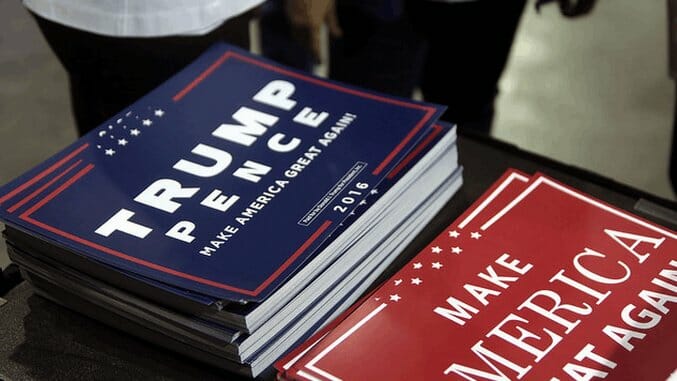Will Space Provide Trump With an Escape Hatch?

Much has been made regarding Trump’s aggressive—or maybe insane is the right word?—positions on climate change, immigration and healthcare during his first months in office. Steeped in controversies surrounding his ties to Russia and seemingly daily Twitter rants, the president has been shrouded in criticism for his entire term thus far. But one area has drawn little to no criticism from both Trump lovers and haters: Space.
The Trump team has hardly touched any space-related policies, a kind of inaction isn’t all too uncommon among most administrations, which would rather create jobs, fill cabinet positions, reshape healthcare and reform taxes. Domestic affairs like building a wall and foreign affairs like deciding which country to bomb obviously attract more attention than latching a robot onto an asteroid. But unlike many presidents of past, Trump has showed almost immediate interest in structuring a national space policy.
Perhaps this bravado is Trump reminiscing about the Apollo era, a period the president probably feels was when America was at its greatest. Beyond his inclination to the early days of the space race, Trump has cheered for a Mars mission in the near future. He’s praised the achievements of Hubble and even signed a NASA bill into law. In a period where Trump faced more Russia allegations, a trade dispute with Canada, and near-constant headlines about his tax-reform proposal and health-care replacement, the President did make time to ring up the American astronauts at the International Space Station for a video call from the Oval Office.
![]()
In a weird way, space policy allows Trump to give his famous, grandiose praise without the threat of backlash. In his Congressional address in February, Trump hinted to landing astronauts on the moon or Mars, “American footprints on distant worlds are not too big a dream,” almost echoing Kennedy’s infamous, “We choose to go to the moon” speech.
Because of this, how genuine are President Trump’s space claims? Is it, like almost anything the man spews, all talk, with no substance?
His first budget indicated virtually no change to NASA funding, decreasing the government program’s finances by 0.8-percent to $19.1 billion. Considering the 18-percent cut to the National Institute of Health and the 30-percent cut to the EPA and the Department of State, NASA came out of this proposal relatively unscathed. In March, the president signed legislation NASA authorization legislation, during which he trumpeted, “Today, we’re taking the initial steps toward a bold and bright new future for American spaceflight.” Following that signing, Vice President Mike Pence announced that the White House will re-establish the National Space Council, which, though dissolved in 1993, will serve to advise the president on space issues. And, concerning deep space exploration, Trump’s made it clear he wants to go to Mars during “my first term or, at worst, my second term.”
But space policy experts are still unsure whether to take any of these claims seriously or as more Trumpisms.
“I wasn’t quite sure whether [Trump] was mis-speaking. Maybe he meant the moon, [not Mars]?” said Professor Tom Pike of Imperial College London (who worked on the 2008 Mars Phoenix Lander) in an interview with Public Radio International. “He’s got to do it on a realistic timescale, and with the budget that gives it the funding that it would require.”
![]()
At the moment, the United States is not only lacking the capabilities for such a launch but it doesn’t even have the technology in place to transport a crew to Mars that fast. We’d literally need a time machine,” says Popular Science.
-

-

-

-

-

-

-

-

-

-

-

-

-

-

-

-

-

-

-

-

-

-

-

-

-

-

-

-

-

-

-

-

-

-

-

-

-

-

-

-








































